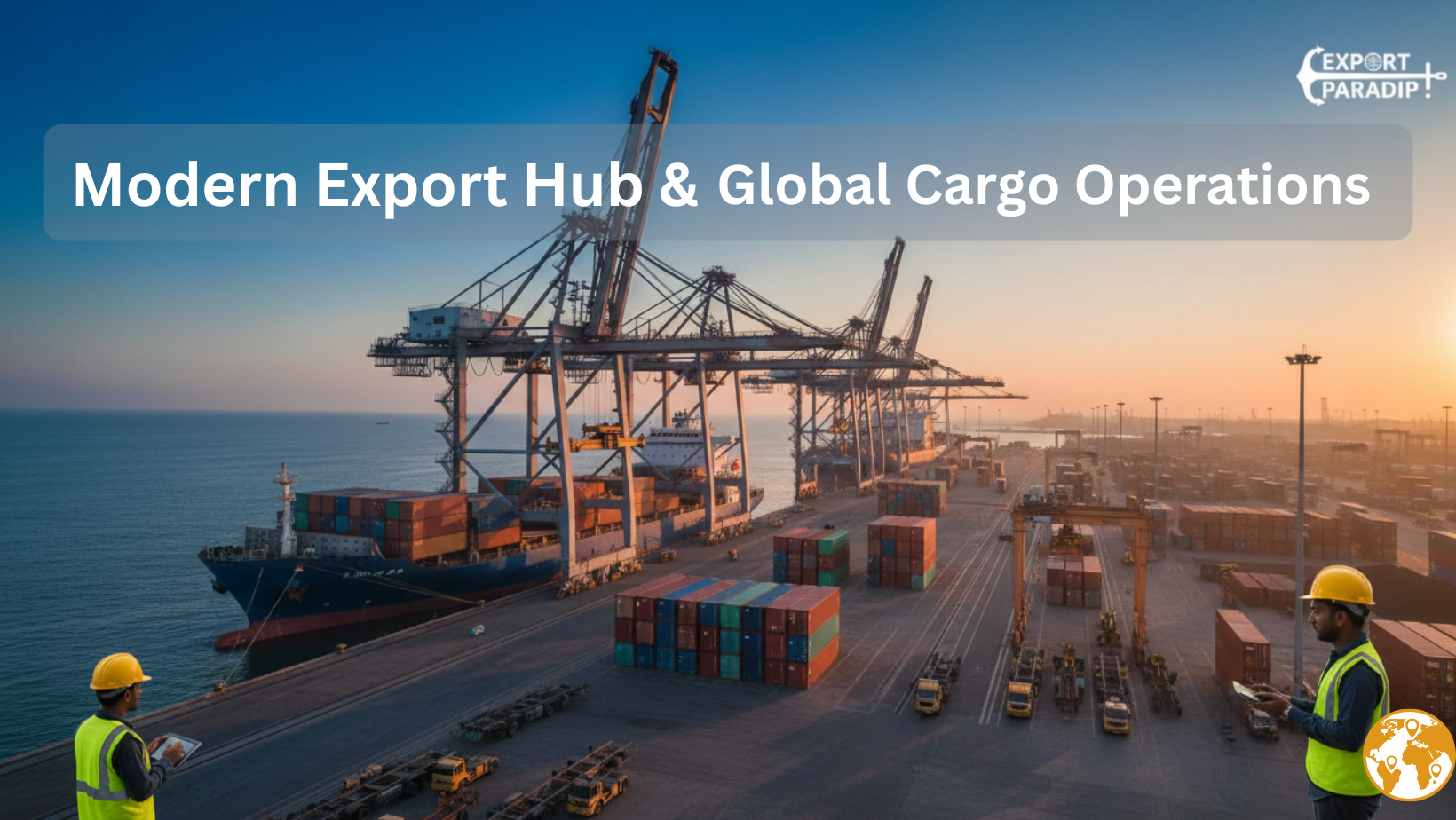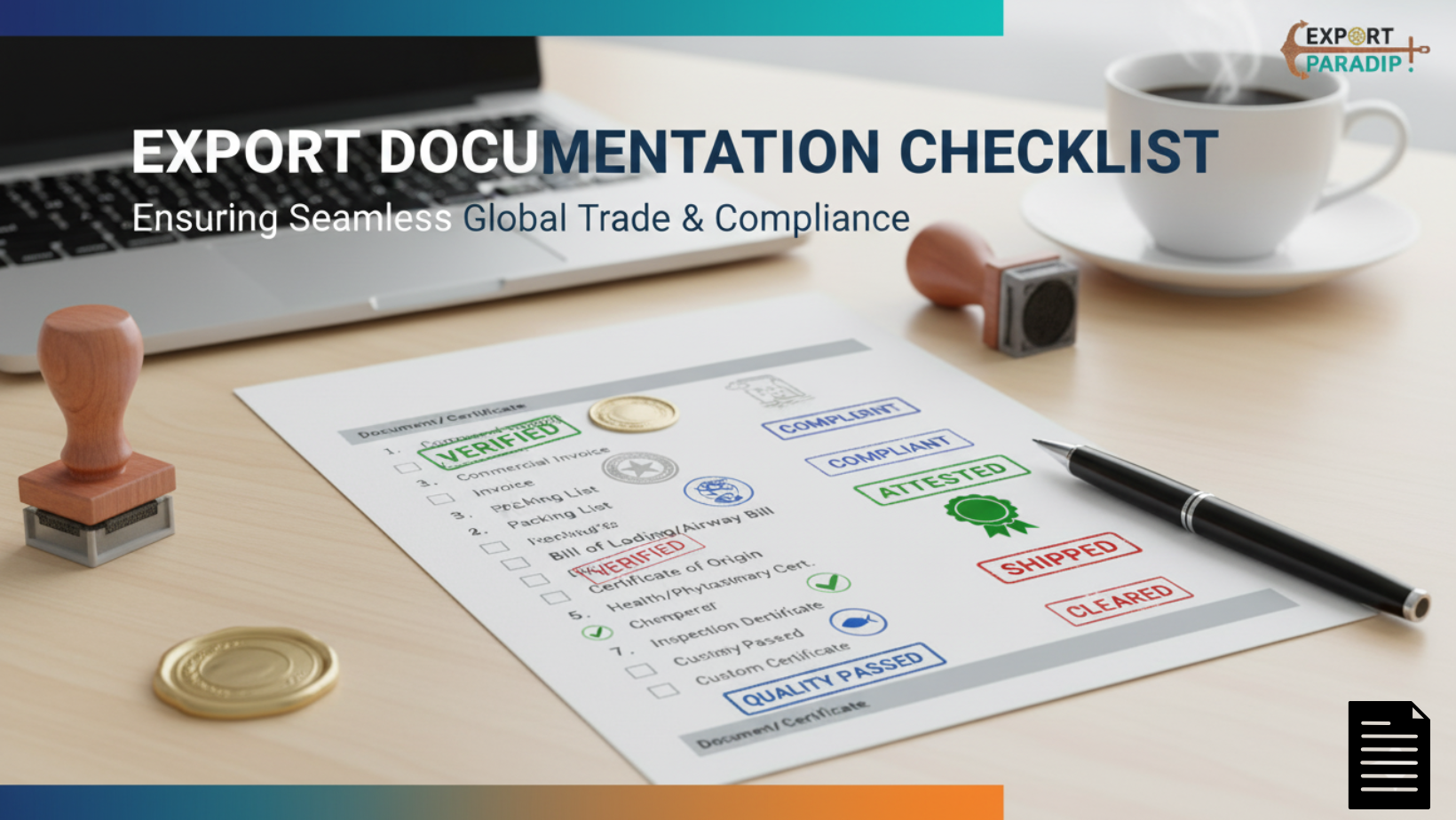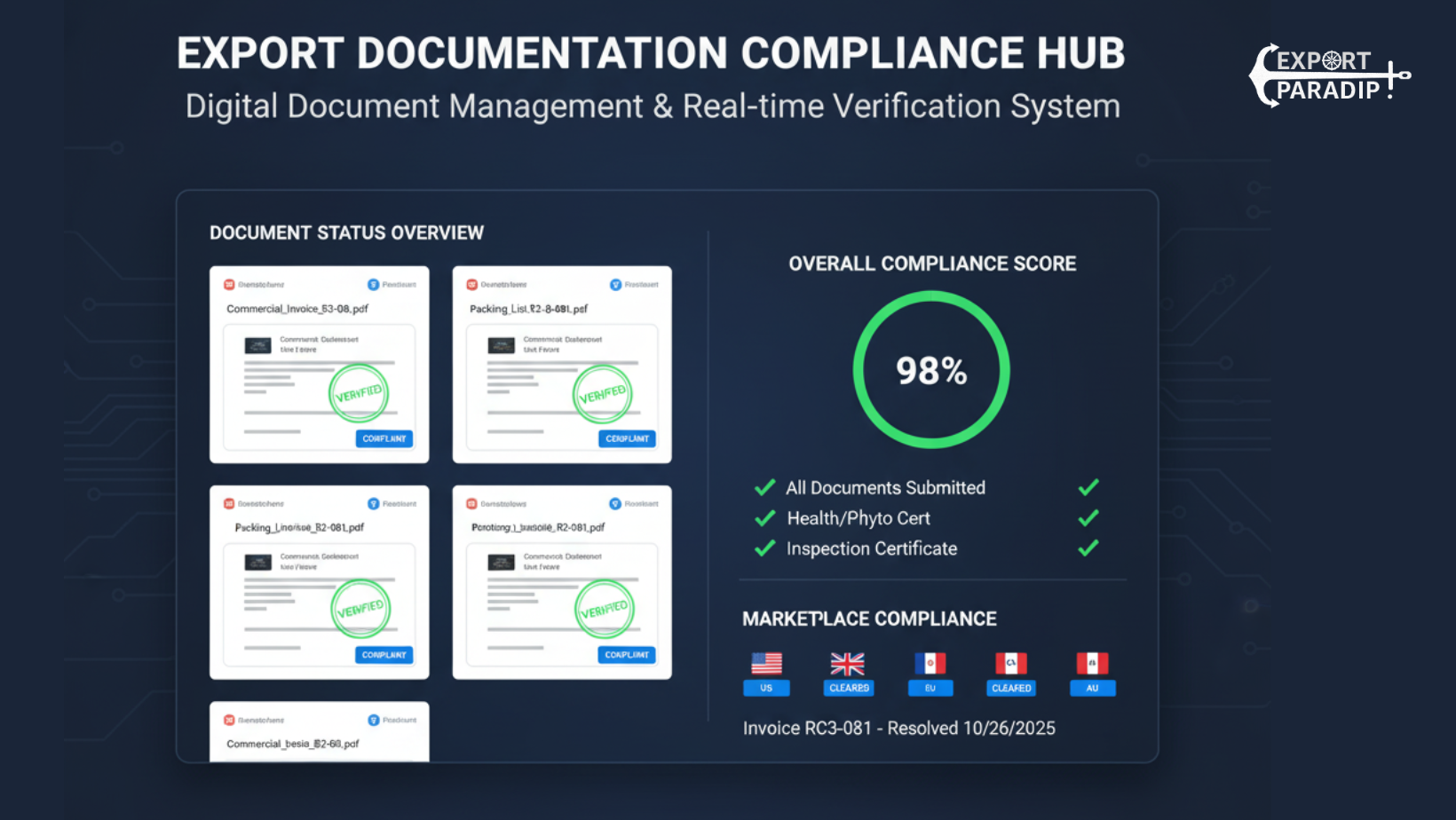Reducing Shipping Delays: Best Practices for Exporters

Introduction: The True Cost of Shipping Delays in Global Trade
In international trade, time is money. A delayed shipment doesn't just mean a late delivery; it can result in penalty charges, damaged buyer relationships, lost contracts & reduced profitability. According to recent industry data, nearly 40% of exporters experience regular shipping delays, resulting in an average cost impact of 15-25% on per-shipment profitability. In 2025, as global supply chains continue to face pressures from geopolitical tensions, port congestion & documentation bottlenecks, the ability to minimize delays has become a critical competitive advantage.
The good news? Most shipping delays are preventable with the right planning, accurate documentation, and logistics partnerships. Whether you're shipping engineering goods to Southeast Asia, pharmaceuticals to Africa, or marine products to Latin America, understanding how to streamline your export process is essential for maintaining reliability & building trust with international buyers.
At Export Paradip, we specialize in helping exporters avoid common pitfalls that lead to delays, from pre-shipment documentation to port coordination & freight management.
1. Pre-Shipment Planning: The Foundation of On-Time Delivery
Why It Matters
Shipping delays often begin long before cargo reaches the port. Poor planning during the pre-shipment phase, such as incomplete documentation, incorrect product classification, or inadequate packaging, can cascade into costly delays at customs clearance or during transit. Successful exporters understand that meticulous pre-shipment preparation is the cornerstone of reliable delivery schedules.
Documentation Accuracy is the first critical checkpoint. Every commercial invoice, packing list, Bill of Lading & certificate must be cross-verified for accuracy. Even minor errors like incorrect consignee names or product descriptions can trigger customs holds lasting several days. HS Code Verification ensures your products are correctly classified under the Harmonized System. Misclassification is one of the most common causes of customs delays & can lead to unexpected duty assessments or cargo inspections.
Product Compliance Checks must be conducted for destination-specific regulations. Different countries have varying standards for product safety, labeling, certifications & environmental compliance. Researching these requirements early prevents shipment rejections at the destination port. Quality Packaging protects your cargo during the long journey & demonstrates professionalism. Export-grade packaging materials, proper palletization, weatherproof covering & clear labeling all contribute to faster cargo handling & reduced inspection requirements.
Strategic Tip:
Create a comprehensive pre-shipment checklist for every export order. This simple practice can reduce documentation-related delays by up to 70% & ensures nothing falls through the cracks during busy shipping periods.
💡 How Export Paradip Helps:
Export Paradip provides exporters with comprehensive pre-shipment checklists, document verification services & compliance guidance to ensure every shipment is ready for smooth processing from day one.
2. Mastering Export Documentation: Zero Tolerance for Errors
 Why It Matters
Why It Matters
Documentation errors are the leading cause of shipping delays worldwide. A single mismatch between documents, such as quantity discrepancies, incorrect consignee details, or missing certificates, can result in shipments being held at customs for days or even weeks. In 2025, with digitalization accelerating across ports & customs authorities, document accuracy has become non-negotiable. The Commercial Invoice serves as the foundation of your export documentation. It must accurately reflect product descriptions, quantities, unit prices & total values exactly as agreed with your buyer. A Bill of Lading acts as your cargo's passport through international waters. Ensure the consignee name, address & notify party details match exactly with other documentation.
Certificate of Origin proves where your goods were manufactured & determines applicable tariff rates under various trade agreements. Expired certificates or incorrect HS codes here can nullify preferential duty treatment & cause customs disputes. Packing Lists must provide precise details about cargo weight, dimensions, package counts & container numbers. Customs & port authorities use this information for cargo handling & risk assessment.
Implement a two-person verification system where one team member prepares documents & another independently reviews them before submission. This cross-check dramatically reduces human error & catches inconsistencies before they become problems.
Strategic Tip:
Digitize your document management system. Cloud-based storage allows multiple stakeholders, freight forwarders, customs brokers & buyers to access correct documentation instantly, reducing miscommunication & speeding up approvals.
💡 How Export Paradip Helps:
Export Paradip offers document review services & automated compliance checks to identify & correct errors before shipments move to the port, saving valuable time & money.
3. Port Selection & Coordination: Choosing the Right Gateway
Why It Matters
Not all ports are created equal. Selecting the right port based on your cargo type, destination & shipping volume can significantly impact transit times. Modern, well-connected ports with efficient cargo handling systems reduce dwell time & improve schedule reliability. Paradip Port (paradeep port), for instance, offers direct connectivity to Southeast Asia, the Middle East & Africa with modern infrastructure & efficient turnaround times.
Connectivity & Shipping Routes determine how directly your cargo can reach its destination. Ports with regular direct sailings to your target markets eliminate transshipment delays & reduce the risk of cargo mishandling. Paradip Port maintains regular liner services to major Asian & African destinations, ensuring consistent schedule reliability. Infrastructure Quality directly impacts cargo handling speed.
Customs Efficiency varies significantly between ports. Facilities with integrated customs clearance systems, risk-based inspection protocols & 24/7 officer availability process shipments faster. Digital documentation submission & electronic payment systems further accelerate clearance times. Congestion Management affects schedule predictability.
Exporters in Odisha, Jharkhand, Chhattisgarh & West Bengal can significantly reduce transit times by utilizing Paradip Port instead of distant alternatives. The port's modern mechanized cargo handling, dedicated berths for different cargo types & proximity to industrial hubs create a compelling value proposition. The port's direct Bay of Bengal access means shorter sailing distances to ASEAN markets compared to western Indian ports, potentially saving 2-4 days in transit time.
Strategic Tip:
Develop relationships with port authorities & terminal operators at your chosen port. Regular communication about upcoming shipments, understanding their operating procedures & staying informed about planned maintenance or upgrades helps you plan better.
💡 How Export Paradip Helps:
Export Paradip provides exporters with real-time port performance data, berth availability updates & coordination with port authorities to ensure smooth cargo movement through Paradip Port.
4. Working with Reliable Freight Partners: Your Logistics Backbone
Why It Matters
Your choice of freight forwarder, shipping line & customs broker can make or break your delivery timelines. Unreliable partners lead to missed vessel schedules, poor cargo tracking & inadequate communication during transit. In 2025, exporters must prioritize partnerships with logistics providers who offer transparency, digital tracking capabilities & proven track records.
Communication Excellence separates professional logistics providers from mediocre ones. Your freight partner should provide proactive updates at every shipment stage: booking confirmation, cargo receipt, vessel departure, transit milestones & arrival notifications. Responsive customer service that addresses queries within hours, not days, is essential.
Route Expertise matters significantly. Freight forwarders with deep experience in your specific trade lanes understand destination-specific requirements, know which shipping lines perform best on those routes & have established relationships with customs brokers at destination ports. Carrier Relationships determine your options during tight capacity situations.
Rather than treating freight forwarders as transactional service providers, develop long-term partnerships with 2-3 reliable companies. These relationships lead to priority handling, better rates on consistent volumes & flexibility during emergencies. Conduct quarterly performance reviews with your logistics partners. Track metrics like on-time pickup rates, documentation accuracy, shipment visibility & issue resolution speed.
Strategic Tip:
Don't switch freight partners solely to save 5-10% on costs. The value of reliability, communication & problem-solving capability far exceeds marginal cost savings. A delayed shipment costs far more than the freight savings.
💡 How Export Paradip Helps:
Export Paradip maintains a network of pre-vetted, reliable freight forwarders & shipping agents with proven performance records, connecting exporters with partners who prioritize on-time delivery.
5. Real-Time Tracking & Proactive Communication: Stay Ahead of Issues

Why It Matters
In today's connected world, buyers expect visibility into their shipment status. Proactive communication about potential delays rather than reactive explanations after problems occur builds trust & maintains strong business relationships. Transparency has become a competitive differentiator.
Pre-Shipment Updates set expectations from the start. Once an order is confirmed, provide your buyer with a detailed shipping timeline including expected cargo ready date, port delivery date, vessel departure date & estimated arrival date. Port Arrival Notifications should be sent immediately when cargo reaches the port.
Vessel Departure Confirmations mark a critical milestone. Share the vessel name, voyage number, Bill of Lading details & updated estimated time of arrival. Provide tracking links that allow buyers to monitor vessel progress independently. Transit Progress Reports maintain engagement during the journey.
Delay Alerts with Solutions are where proactive communication shines brightest. If you become aware of potential delays port congestion, customs inspections, or vessel schedule changes, inform buyers immediately, along with your action plan to minimize impact. Implement integrated tracking platforms that consolidate information from multiple sources into a single dashboard. Provide buyers with self-service tracking portals where they can check shipment status anytime without contacting you.
Strategic Tip:
Create standardized communication templates for different shipment stages. This ensures consistent, professional updates while saving time on repetitive communications.
💡 How Export Paradip Helps:
Export Paradip offers exporters access to integrated tracking systems & provides regular shipment status updates, enabling exporters to keep their buyers informed throughout the journey.
Conclusion
Shipping delays don't have to be an inevitable part of international trade. With proper planning, documentation accuracy, strategic port selection & reliable logistics partnerships, exporters can dramatically reduce delays & build a reputation for reliability in global markets.
Export Paradip is committed to helping exporters achieve operational excellence through every stage of the export journey, from documentation to delivery. Our expertise, port connectivity & commitment to exporter success make us the ideal partner for businesses seeking reliability in international trade.
Ready to Eliminate Shipping Delays from Your Export Operations?
Contact Export Paradip today to discover how we can help you streamline your export process & ensure timely deliveries to your international buyers.
Email: exportparadip@gmail.com
Phone: 06744508186
Let's make your export journey smooth & successful through Paradip Port (** Paradeep Port **).
FAQs
What are the most common causes of export shipping delays?
The primary delay causes include documentation errors (incorrect or incomplete paperwork), customs clearance issues (compliance problems or inspections), port congestion, carrier schedule changes, and inadequate pre-shipment planning. Documentation mistakes alone account for nearly 60% of preventable delays. Working with experienced logistics partners and implementing thorough verification processes can eliminate most of these issues.
How much advance planning time should exporters allocate for international shipments?
Ideally, begin planning 3-4 weeks before your desired shipment date for standard cargo, and 6-8 weeks for specialized or regulated products requiring additional certifications. This timeline allows adequate time for documentation preparation, compliance verification, port coordination, and contingency planning. Rush shipments increase delay risks and often incur premium costs without guaranteed time savings.
Why does choosing Paradip Port reduce shipping delays for regional exporters?
Paradip Port offers several delay-reduction advantages: modern mechanized infrastructure for faster cargo handling, direct connectivity to key Asian and African markets (eliminating transshipment), efficient customs clearance systems, reduced congestion compared to overcrowded metro ports, and geographic proximity to industrial regions in Eastern India (reducing inland transit time and costs). These factors combine to save 2-4 days compared to alternative ports.
How can small and medium exporters implement effective shipment tracking without large technology investments?
Most modern freight forwarders provide digital tracking portals at no additional cost as part of their standard service. Additionally, shipping lines offer free container tracking through their websites using Bill of Lading numbers. Export Paradip also provides tracking support to help exporters maintain visibility. The key is choosing logistics partners who prioritize transparency and communication rather than investing in separate expensive systems.
What should exporters do when they discover a potential delay in their shipment?
Take immediate action: First, verify the delay cause and expected duration with your freight forwarder or shipping line. Second, assess impact on delivery commitments and any contractual implications. Third, inform your buyer proactively with transparent information and your action plan. Fourth, explore mitigation options like alternative routing, expedited customs clearance, or upgraded transport. Fifth, document everything for future reference and continuous improvement. Proactive communication often preserves business relationships even when delays occur.
